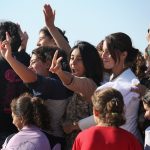Yazidi refugees celebrate news of the liberation of their homeland of Sinjar from ISIS in 2015. (Photo by John Moore/Getty Images)
I still remember it vividly. Just over three years ago, in August 2014, I woke up to the news that ISIS – also known as the Islamic State – had launched unprecedented, orchestrated attacks on Yazidi villages in Northern Iraq. Being from Syria, a country plagued by ISIS, I knew very well how ruthless these fighters are. But what happened to the Yazidis exceeded my most pessimistic predictions. ISIS besieged the Yazidi villages, separating the men and boys from the women and girls. They slaughtered thousands of men and older women. ISIS then divided the women according to their age, beauty, and virginity and then sold them into sexual slavery. Those women were raped, tortured, forced into marriages, and made to convert to Islam. As part of a prolonged effort to erase their identity – a crucial element of genocide – young boys were separated from their families and sent to ISIS indoctrination camps, where they were given Islamic names and trained to be child soldiers. This multiplicity of war crimes and crimes against humanity were recognized by many, including the United Nations, the United States, and the European Union, as a genocide. Sadly, it’s a genocide that is still ongoing.
Three years have passed, marked by various political changes and upheavals in Iraq and the region. Attention returned to Iraq recently after Iraqi forces – alongside an international coalition – freed the city of Mosul from ISIS’s grip. Despite that victory, the Yazidi ordeal is far from over. In principle, the Yazidis’ villages have been liberated from ISIS, but they are still unable to go back. Many of their homes are now rubble; others fear being caught again in the potentially explosive internal tensions caused by the proliferation of armed groups struggling for control over Iraq’s Sinjar district, a disputed area under control of several groups. Moreover, more than 3,000 women and children are still in ISIS captivity. Those fortunate enough to have escaped live with memories of violence and suffering etched in their minds, and with a constant worry about family members still in captivity.
In short, the people of northern Iraq have endured an unprecedented wave of violent crimes, destruction, and displacement. In response, Physicians for Human Rights has launched a project to train stakeholders in Iraq to document these crimes, establish a historical record, and contribute to the justice process. Since October 2016, PHR’s team of forensic, legal, and medical experts has met with representatives of governmental and non-governmental organizations, international organizations, and judicial bodies across northern Iraq, as well as doctors, lawyers, and health professionals.
Our initial aim was to gain a comprehensive understanding of the current capacities in Iraq to document, collect, and preserve evidence of war crimes and crimes against humanity. We found that there is a clear need to train local health care workers and first responders on the international standards of documentation of torture, while at the same time ensuring that survivors are protected in the process. Mindful that many international and national organizations, as well as Yazidi ones, are working on the ground, PHR seeks to enhance cooperation and coordination without stepping on toes. The idea is to promote the role of medical and forensic techniques in the investigation and documentation of crimes, but also to avoid potential duplication of efforts and to prevent re-traumatizing survivors.
Besides documentation, PHR is supporting local efforts to design patient-centered roadmaps for survivors who have suffered deep trauma and are in need of long-term psychological and psycho-social support.
“Survivors are severely traumatized and in need of specialized rehabilitation and treatment programs,” said Dr. Nagham Hussain, a Yazidi doctor at the Women and Girls Support Center in Dohuk, which has so far provided care for more than one thousand women and girls. She has taken part in PHR’s training programs in Iraq. “In some cases women don’t talk for months, and, in others, women still identify with their former captors.” In addition, many of the children indoctrinated by ISIS are showing violent tendencies around their families and communities. These boys also require psychological intervention, as do their families.
In our latest trip to the region, we convened health care professionals, forensic doctors, psychologists, psychotherapists, and nurses to discuss future training sessions. We presented the globally-recognized standards for forensic and psychological documentation of torture and sexual violence. We listened to feedback and recommendations from our Iraqi colleagues. Those recommendations will guide us as we design a curriculum that adheres to the religious, cultural, and traditional norms in the communities where we work. Our next trip will bring together not just health professionals but also police, judges, and other members of the community to showcase the importance of coordination among these sectors.
This isn’t PHR’s first foray into this work. We’re adapting what we learned conducting similar successful projects in Kenya, the Democratic Republic of the Congo, and elsewhere. Our Iraqi colleagues are eager to gain and spread the knowledge of international standards of documentation across the country, and we are positive that the training we aim to provide going forward will be the first milestone in a challenging yet hopeful road to provide adequate reconciliation, reparation, compensation, and justice for survivors of ISIS crimes in Iraq.

